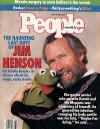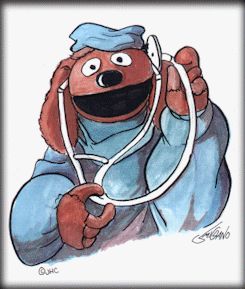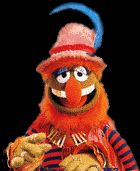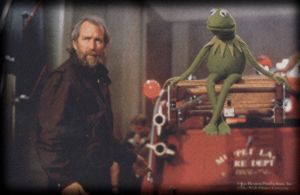| A
R T I C L E S |
New Collectibles •05/25 - NECA Sesame Street: Count Von Count Ultimate Action Figure
•04/25 - Reaction Sesame Street: Big Bird and Snuffy •03/25 - NECA Sesame Street: Ernie Ultimate Action Figure, Bert Ultimate Action Figure
•03/25 - Boss Studios Fraggle Rock: Boober Action Figure, Wembley Action Figure, Mokey Action Figure, Sprocket Action Figure •08/24 - Reaction Sesame Street: Big Bird, Mr. Hooper, Sherlock Hemlock, Super Grover |
||
|
|
|

Legacy of a Gentle Genius
By
Susan Schindehette
PEOPLE MAGAZINE, Volume 33, Number 24
June 18, 1990
 Four
years ago, during a vacation on the Cote d'Azur, Jim Henson sat down to
write a letter to his children, with the wish that it not be opened until
his death. "I'm not at all afraid of the thoughts of death
and look forward to it," he wrote. "I suggest you first
have a friendly little service of some kind. It would be lovely
if there was a song or two... and someone said some nice, happy words
about me... This all may sound silly to your guys, but what the hell,
I'm gone - and who can argue with me?"
Four
years ago, during a vacation on the Cote d'Azur, Jim Henson sat down to
write a letter to his children, with the wish that it not be opened until
his death. "I'm not at all afraid of the thoughts of death
and look forward to it," he wrote. "I suggest you first
have a friendly little service of some kind. It would be lovely
if there was a song or two... and someone said some nice, happy words
about me... This all may sound silly to your guys, but what the hell,
I'm gone - and who can argue with me?"
It was like Henson - modest and unassuming - to ask only for a song or two and some nice, happy words. What was remarkable was that a man best known for his quiet gentleness left such a resounding echo in the world upon leaving it. As worldwide accolades attested after his death on May 16th, puppeteer Jim Henson, along with his endearing menagerie of creatures, had undoubtedly secured a niche as one of the most universally beloved entertainers of his generation.
And that is what made his sudden, unexpected absence seem all the more difficult to accept. The man who created characters of timeless appeal had suddenly proved to be frighteningly mortal. But if Henson's death at age 53 from a severe but treatable disease, Group A streptococcus pneumonia appears unfathomable, it is not. Its cause lay not entirely in the illness but, ironically, and sadly, in his own character. Henson's humility, his desire never to bother anyone - became genuinely tragic flaws in the end. Not wanting to trouble his family, not wanting to trouble the doctors - these were the reasons he postponed going to the hospital until it was six to eight hours too late.
"Some people say you can choose the way you die," muses his wife, Jane, who still speaks of Henson in the present tense. "I think he would choose to die with as little trouble to everyone as possible."
 Searching
for some sort of foreshadowing themes in his life, Henson's friends and
family recall 1986 as a watershed year. The enduring Muppets had
just celebrated their 30th anniversary, but Labyrinth, a dark, Muppet-less
fantasy, had fared poorly at the box office, as had the Dark Crystal before
it. "They were great losses, and Labyrinth was a real blow,"
says Jane Henson. "He couldn't understand it. He talked
to [our son] Brian and said, 'What did we do wrong?' "
Searching
for some sort of foreshadowing themes in his life, Henson's friends and
family recall 1986 as a watershed year. The enduring Muppets had
just celebrated their 30th anniversary, but Labyrinth, a dark, Muppet-less
fantasy, had fared poorly at the box office, as had the Dark Crystal before
it. "They were great losses, and Labyrinth was a real blow,"
says Jane Henson. "He couldn't understand it. He talked
to [our son] Brian and said, 'What did we do wrong?' "
It was also that year that the Hensons, wed in 1959, legally separated after living apart for more than two years. "He was working a lot," Jane says of the breakup. "His attention was always on whatever projects there were. He'd just sort of grown on to another stage." Despite their separation, the two had never divorced. "It seemed like we were always kind of married, but not really," she says, "still together, in a different kind of way."
"He dated a few people during the time that he and his wife were separated," say his agent, Bernie Brillstein. "If he was with a girl, he liked her for the time he was with her. Jane had a special place in his heart. I have the feeling that he didn't want to get a divorce." He left his business to his five children and enormously enhanced its value by setting in motion its sale to the Walt Disney Company, last spring. In addition to netting him up to $200 million, the deal also freed him to concentrate on creative endeavors. In recent months, jetting between New York City, Los Angeles and Orlando. Henson was working on an array of projects: films, the Muppet premiere at Walt Disney World (scheduled for this week), even a TV series called Muppet High. "He would call and say, 'I'm at the beach, come on over.' "says Brillstein, "and you wouldn't know if he meant Brighton or Malibu."
What had impressed everyone about Henson from the start was his gentle, unpretentious nature. Brillstein, persuaded to see Henson by Kukla, Fran and Ollie creator Burr Tillstrom, remembers first meeting what he thought was an unknown puppeteer from Washington, D.C., in 1960. "I didn't want to see him," says Brillstein, "but up came this young Abe Lincoln wearing some kind of hippie arts-and-crafts clothes. Just then my boss called and said, "Have you ever heard of Jim Henson and the Muppets? Someone wants to book him into Radio City Music Hall.' "
In 1969 Henson's creations - Kermit, Big Bird and Cookie Monster - first appeared on public TV's Sesame Street, perhaps the most influential children's show ever. Then in 1976, bankrolled by British impresario Lord (Lew) Grade, The Muppet Show was born. "After that," says Brillstein, who remained Henson's friend and agent for 30 years, "he kind of belonged to the world."
Over the course of two furiously creative decades, Henson parlayed his Muppet menagerie into a multimillion-dollar empire. "Jim was as famous in the rest of the world as he was in America," says Duncan Kenworthy, head of Henson's London-based Creature Shop. "In Japan he's as well-known as Steven Spielberg."
If Henson's creativity and business acumen were singular, so say associates, was the spirit that permeated his organization. "We were together 30 years without a contract," says Brillstein, "and he walked on this earth like no one else I know. He was my biggest account, the backbone of this office. But if he wanted a meeting with you, it was always, 'Do you mind? Do you have time?' "
"In the 11 years I worked with him, I never once heard him raise his voice," says Kenworthy. "He was not the sort who led by shouting at people or pointing out their inadequacies. His was a very gentle hand on the tiller."
In the words of Carroll Spinney, who for over 20 years played Big Bird and Oscar the Grouch, "He would never say he didn't like something. He would just go 'Hmm." That was famous. And if he liked it, he would say, 'Lovely.' Everything was lovely - a place, a show... ."
With a beard worn to cover the scars of adolescent acne and self-conscious about his gangly, 6'3" height, Henson overcame shyness best when speaking through Muppets. "One time he and [longtime collaborator] Frank Oz had to do a satellite connection very early in the morning," says Duncan Kenworthy. "I asked how it went, and Jim said, 'I was terrible. But Kermit was great.' "
 Though
Henson's personal style was modest, enormous wealth had come along with
creative success. There were comfortable houses in London, Malibu,
Connecticut and Orlando, an occasional Rolls or Porsche and such exotic
pastimes as hot-air ballooning in France and camel riding in Egypt.
"He was a modest guy in some ways," says daughter Heather, at
19, the youngest of Henson's five grown children. "In other
ways he was completely over the top."
Though
Henson's personal style was modest, enormous wealth had come along with
creative success. There were comfortable houses in London, Malibu,
Connecticut and Orlando, an occasional Rolls or Porsche and such exotic
pastimes as hot-air ballooning in France and camel riding in Egypt.
"He was a modest guy in some ways," says daughter Heather, at
19, the youngest of Henson's five grown children. "In other
ways he was completely over the top."
More than just an indulgence, the lifestyle also served as a connecting bridge to his all-important family. "The houses," says publicist Arthur Novell, "were in large part so he had a place for his children wherever they visited; he wanted them with him whenever possible."
"He loved to take us traveling with him," says Heather, a sophomore at the Rhode Island School of Design "It was how we most often saw him. He wouldn't separate us from his work."
In recent years, say friends, Henson was showing signs of age. "Turning 50 was very traumatic for him," says a close friend. "He was an entertainer, a performer. He was working out and had a rowing machine, but he was aware that he was looking older." A month ago over dinner, says Brillstein, "He had his usual one drink, probably a kir, and we talked about life, our marriages, how we were all lucky. How we should all be thankful that God was so good to us."
 Then
on Friday, May 4, Henson was a guest on the Arsenio Hall Show. "He
admitted he was tired, that he had a sore throat," says Novell.
"but he insisted it would go away." True to form, instead
of resting in L.A., he went shopping for antiques, then flew to New York
for work on the Disney deal and Muppet projects.
Then
on Friday, May 4, Henson was a guest on the Arsenio Hall Show. "He
admitted he was tired, that he had a sore throat," says Novell.
"but he insisted it would go away." True to form, instead
of resting in L.A., he went shopping for antiques, then flew to New York
for work on the Disney deal and Muppet projects.
On Saturday, May 12, on what was to be the last weekend of his life, Henson, along with daughter Cheryl, made one of his frequent trips to the rural farm town of Ahoskie, N.C., to visit his father and step-mother. "This was the one place he could come where he was totally private," says Barbara Henson. "We have a secret porch, and he just loved sitting out there. He said it was the quietest place he could be." That Saturday afternoon was spent playing a rousing game of croquet. "We all went out for supper," she says. "We had all the family here, maybe 10 or 12 of us, with the children. We just laughed and had a wonderful time."
That night, Henson and Cheryl stayed at a nearby motel, but on "Sunday morning he didn't want to get up," says Barbara. "We thought, 'Oh he's tired. Let's let him sleep.' When Cheryl brought him over for lunch, he didn't feel like eating. He had the sniffles, and he looked tired. But this had been a busy few moths for him lately, and we felt it was understandable."
Henson changed to an earlier flight home. "Coming back Sunday from the airport, he was really tired," says Cheryl, "He sat down on the side of the radiator [in the arrivals area], and I said, 'Oh Daddy, are you okay?' And he said, 'I'm just tired.' Then he said, 'Hi ho, Kermit the Frog here.' It was very unlike him, I said, 'What, Daddy?' "
On Sunday, back in his three-bedroom apartment at the Sherry-Netherlands Hotel, with its panoramic view of Central Park, Henson tried to rest for a Muppet recording session the following day. "When I found out in the morning that he had canceled," says Cheryl, "I realized he really wouldn't do that unless he was sick."
On Monday she visited him, as did his assistant, Anne Kinney, and his son Johnny. "I called him, and he said he'd had a very rough night," says Jane, "but that Anne was there and Johnny was coming over. Everybody was coming in trying to give him chicken soup. I never stay over, I haven't in years, but he asked me to stay." Jane arrived at 7 P.M. and, along with Jim, "we just talked. There was no division of broken marriage or anything like that. We were just there together."
By 2 A.M. Henson was having difficulty breathing and had been coughing up blood, though Jane didn't know for how long. "I remember saying, 'Can we go to the hospital? Can we call a nurse, a doctor?' " she says. "But he said, 'just rub my back. Try to calm down my breathing.' At one point, he said, 'Maybe I'm dying.' He did say that. But, you know, whenever you're sick, you say, 'God, I feel like I'm going to die.' "
Still, he did not leave for a hospital. Part of the reason, says Jane, was his Christian Science upbringing. While he didn't practice the faith, "it affects his general thinking," says Jane. "Not that he mistrusted doctors, but he would rather just see it through by himself."
The more critical reason was that he just didn't want to bother anyone. "I think he knew there was a possibility he was dying," says Jane, "and that possibly was why he didn't want to go to a doctor. He really didn't want anyone else to be disturbed by his pain."
At 4 A.M. Henson finally told Jane, "I'm breathing too hard. My heart's racing... . Okay, I'll go to the hospital." They called for a car and were taken to New York Hospital but were left at the wrong entrance. Realizing his error, the driver offered to take them to another door, but Henson declined. Typically, he didn't want to inconvenience the man and walked a quarter block to the entrance.
By the time Henson was admitted, his body was rapidly shutting down. Initial X rays showed small pockets of infection. Several hours later they had spread through his lungs. At 8 A.M. Henson was anesthetized and put on a ventilator. "He was still completely alert, but not comfortable," says Jane. "It was when he was anesthetized that we waved goodbye to him. He didn't say anything. He waved a little. They said we could see him in the intensive-care ward in a few hours."
They would not see him conscious again. Throughout the day, Jane, four of their five children, Frank Oz and a handful of friends kept vigil in the hospital corridor. "Evening came, and it was quiet," says Jane. "we were comforting each other, tiptoeing back and forth to see him. They were giving him all kinds of antibiotics, trying to keep him alive long enough for them to take effect." At 1:21 Wednesday morning, after two cardiac arrests, his heart stopped beating for the final time.
 At
Henson headquarters in an elegant town house on New York City's East Side,
filled with tiny Muppets and Fraggle figurines, a sympathy card rests
on a grand piano in the wood-paneled library. A drawing from Disney's
crew of designers - the Imagineers - shows Mickey Mouse sitting on a log
before a magnificent sunset, his arm draped around a downcast Kermit.
At
Henson headquarters in an elegant town house on New York City's East Side,
filled with tiny Muppets and Fraggle figurines, a sympathy card rests
on a grand piano in the wood-paneled library. A drawing from Disney's
crew of designers - the Imagineers - shows Mickey Mouse sitting on a log
before a magnificent sunset, his arm draped around a downcast Kermit.
If a sense of loss is evident throughout the Henson empire, so is the conviction that his vision will live on. "There was a quality that I could never quite grasp about Jim," says his widow. "But he needed to accomplish something. He knew he could make a difference. It's not as if he knew he was going to die, but I think he realized he wouldn't be around a lot longer. He didn't think he'd ever be an old man - and it was time to put things in a place where they'd continue without him."
Perhaps that explains some of his acts during the last years - the deal with Disney, for example, or the letter he wrote to his children asking for "a friendly little service of some kind." That wish was granted in a vibrant service at Manhattan's Cathedral of St. John the Divine, where 5,000 colorfully dressed fans fluttered hand-painted butterflies, as a Dixie-land band trumpeted "When the Saints Go Marching In."
At the end, Henson's own simple words, recited by his daughter Cheryl best explained what had driven him. "I believe in taking a positive attitude toward the world," he once wrote. "My hope still is to leave the world a little bit better than when I got here." For at least as long as a green felt frog lives in memory, there can be no question that he did.
|
|
|
home | news | collectibles | articles | forum | guides | radio | cards | help
Fan site Muppet Central created by Phillip Chapman. Updates by Muppet
Central Staff. All Muppets, Bear
Muppet Central exists to unite fans of the Muppets around the world. |